| Srl | Item |
| 1 |
ID:
137605
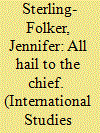

|
|
|
|
|
| Summary/Abstract |
Analytical pluralism in IR theory is a welcome development, yet it may also play a role in reifying our contemporary liberal world order. While there is clearly greater analytical diversity in the IR discipline today than in the latter half of the twentieth century, it is a diversity that is contained within the boundaries of acceptable liberal discourse. As a result, it does not constitute a challenge to dominant disciplinary ways of knowing and being. IR theory may enjoy a circumscribed version of analytical diversity in which multiple voices may speak but power does not listen. This possibility and its implications are considered, with particular attention paid to liberalism and positivism as the dominant analytical project of the contemporary moment.
|
|
|
|
|
|
|
|
|
|
|
|
|
|
|
|
| 2 |
ID:
137606
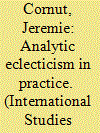

|
|
|
|
|
| Summary/Abstract |
The relation of different theoretical approaches to one another is a disquieting question in International Relations (IR). Building on recent scholarship addressing the logic of questions and the analytical tools the scholarship provides for investigating the contributions of different explanations this piece argues that any and all explanations are an answer to a contrastive why-question. First, the article presents the objections to eclecticism. It then reviews the application of the logic of questions to IR and develops a “contrast theory” clarifying this logic: Seeking an explanation means delimiting a contrast space within a specific interrogatory context. The article lastly shows how these concepts help in thinking about post-foundational science of IR, that is, a science with no universal epistemological foundation to knowledge. I argue that the pragmatic, problem-driven and complexity-sensitive research agendas are a stronger foundation than currently predominant conceptualizations. An example, drawn from Iran's attempts to acquire nuclear weapons, helps illustrate the value-added by a logic of questions approach
|
|
|
|
|
|
|
|
|
|
|
|
|
|
|
|
| 3 |
ID:
137601
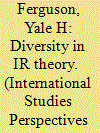

|
|
|
|
|
| Summary/Abstract |
Rather than dead or even moribund, International Relations (IR) theory is most certainly “alive,” although of course exactly how “well” remains a matter for debate. This article explains that each of the traditional and more recent “schools” of theory has its important strengths and serious weaknesses. Some theories are more appropriately applied to particular problems than to others. Analysts need to be conversant with a wide range of theories so they can recognize them when they are being employed (even only implicitly) and also use them as a toolkit when developing a research subject or explanations for patterns observed. Viewing some subjects simultaneously from more than one theoretical perspective often enhances understanding.
|
|
|
|
|
|
|
|
|
|
|
|
|
|
|
|
| 4 |
ID:
137602
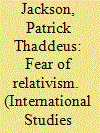

|
|
|
|
|
| Summary/Abstract |
Although scholars toss around the word “relativism” when debating the merits of various methodological approaches in international studies, there is a lack of clarity about what it might mean to have a relativist position on the production of social-scientific knowledge. As a result, a lot of the ink spilled about the potential dangers of relativism is overblown. A little philosophical and logical clarity goes a long way towards dispelling that particular bogeyman.
|
|
|
|
|
|
|
|
|
|
|
|
|
|
|
|
| 5 |
ID:
137603
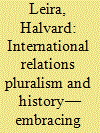

|
|
|
|
|
| Summary/Abstract |
This article approaches the possibility of achieving pluralist International Relations research through engagements with history/History. There are serious sociological and disciplinary challenges to achieving pluralism, most importantly related to the need to make a mark and a career in one specific discipline and the constant diversification of disciplines. Even so, drawing on the literature of amateurism, understood as engaging in an activity for the love of it, it is argued here that a spirit of engaged amateurism in dealing with history offers an important opportunity for exploring commonalities and fostering pluralism both within the discipline and across disciplinary boundaries.
|
|
|
|
|
|
|
|
|
|
|
|
|
|
|
|
| 6 |
ID:
137607
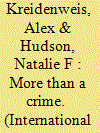

|
|
|
|
|
| Summary/Abstract |
Using the case of anti-trafficking policy in Ohio, this paper examines the emergence and impact of localized policy efforts against the global phenomenon of human trafficking. We argue that the manner in which human trafficking is characterized by international and national policymakers has engendered flawed policy approaches. Specifically, we find that local actors have replicated wholesale the discourse and policy frames developed and adopted by international organizations and national governments. While well intentioned, current characterizations and the subsequent policies have uniformly failed to stem the time of human trafficking even at the local level. Therefore, we examine the human security approach as an alternative means to describe and frame human trafficking and suggest that such a political discourse has the potential to prescribe more effectual policies against human trafficking.
|
|
|
|
|
|
|
|
|
|
|
|
|
|
|
|
| 7 |
ID:
137608


|
|
|
|
|
| Summary/Abstract |
US Internet governance policy, it has been argued, is a threat to the Internet. Calls persist for the development of a multilateral Internet governance organization where states, especially the United States, play a lessened Internet governance role. Yet, US policymakers continue to resist greater multilateralism in global Internet governance favoring instead multistakeholder governance. Why do US policymakers continue to resist greater multilateralism in global governance of the Internet? Employing the Open Door interpretation of US diplomatic history, I show that, in the post–Cold War era, US policymakers purposed the Internet as a platform for the expansion of American products and political ideals and view greater multilateralism in global Internet governance as a threat to this purpose for the Internet. US policymakers will continue to support the present multistakeholder Internet governance structure that reflects US Internet governance policy preferences. Efforts at greater multilateralism in global governance of the Internet will continue to encounter US resistance unless such efforts incorporate US Internet governance policy preferences.
|
|
|
|
|
|
|
|
|
|
|
|
|
|
|
|
| 8 |
ID:
137604


|
|
|
|
|
| Summary/Abstract |
This paper develops three basic arguments in the context of this forum: that IR theory is genuinely pluralistic though those who see only apparent pluralism have a point. That discussions of pluralism in IR often run together the claims that pluralism is intrinsically valuable and that it is instrumentally valuable, and that these two claims need to be kept separate and examined more critically than they often are. And that pluralism is not Relativism and should not be assumed to be. Finally the paper suggests that IR theory might need to take on a still further aspect of pluralism if it wishes to properly understand the implications of plurality.
|
|
|
|
|
|
|
|
|
|
|
|
|
|
|
|